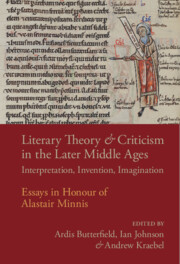Book contents
- Literary Theory and Criticism in the Later Middle Ages
- Literary Theory and Criticism in the Later Middle Ages
- Copyright page
- Contents
- Figures
- Contributors
- Preface and Acknowledgements
- Abbreviations and Conventions
- The Career and Contributions of Alastair Minnis
- Introduction
- Chapter 1 Access through Accessus
- Chapter 2 Scholastic Theory and Vernacular Knowledge
- Chapter 3 Poetics and Biblical Hermeneutics in the Thirteenth Century
- Chapter 4 Robert Holcot and De vetula
- Chapter 5 The Inspired Commentator
- Chapter 6 Guitar Lessons at Blackfriars
- Chapter 7 The Re-cognition of Doctrinal Discourse and Scholastic Literary Theory
- Chapter 8 Arts of Love and Justice
- Chapter 9 The Many Sides of Personification
- Chapter 10 Encountering Vision
- Chapter 11 George Colvile’s Translation of the Consolation of Philosophy
- Chapter 12 When Did the Emotions Become Political?
- Bibliography of the Works of Alastair Minnis
- Bibliography
- Index
Chapter 4 - Robert Holcot and De vetula
Beyond Smalley’s Assessment
Published online by Cambridge University Press: 20 April 2023
- Literary Theory and Criticism in the Later Middle Ages
- Literary Theory and Criticism in the Later Middle Ages
- Copyright page
- Contents
- Figures
- Contributors
- Preface and Acknowledgements
- Abbreviations and Conventions
- The Career and Contributions of Alastair Minnis
- Introduction
- Chapter 1 Access through Accessus
- Chapter 2 Scholastic Theory and Vernacular Knowledge
- Chapter 3 Poetics and Biblical Hermeneutics in the Thirteenth Century
- Chapter 4 Robert Holcot and De vetula
- Chapter 5 The Inspired Commentator
- Chapter 6 Guitar Lessons at Blackfriars
- Chapter 7 The Re-cognition of Doctrinal Discourse and Scholastic Literary Theory
- Chapter 8 Arts of Love and Justice
- Chapter 9 The Many Sides of Personification
- Chapter 10 Encountering Vision
- Chapter 11 George Colvile’s Translation of the Consolation of Philosophy
- Chapter 12 When Did the Emotions Become Political?
- Bibliography of the Works of Alastair Minnis
- Bibliography
- Index
Summary
There is a fair likelihood that the most widely read work of a late medieval English author was Robert Holcot’s extensive Super Sapientiam Salomonis. More than 170 copies of the work, the standard late medieval commentary on the text, have been identified. But Holcot – and the implications of his work – have remained strangely uninvstigated, since Beryl Smalley first drew him to attention some sixty years ago. (And neither Judson Allen’s study of Holcot’s colleague John Ridewall nor a recent Oxford University Press volume have done much except repeat Smalley’s contentions.) Smalley was a great scholar of Christian exegesis, but her comments on Holcot (and others of her ’classicising friars’, like Ridewall) were handicapped by her very strengths; she could only identify his behaviour, an interest in classical culture the display of which she found tedious, as exegetically divergent. The essay, beyond a close reading of Holcot’s programmatic prologue, examines one of his more diverting ’authorities’, the pseudo-Ovidian De vetula, and explores some reasons for Holcot’s fascination.
- Type
- Chapter
- Information
- Literary Theory and Criticism in the Later Middle AgesInterpretation, Invention, Imagination, pp. 78 - 93Publisher: Cambridge University PressPrint publication year: 2023



